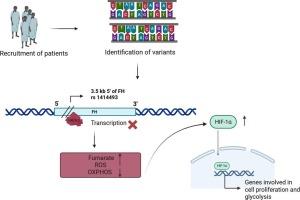乳腺癌患者FH调控基因多态性(rs1414493)的芯片分析及功能评价
IF 0.9
Q4 GENETICS & HEREDITY
引用次数: 0
摘要
代谢重编程是癌症的一个标志,部分是由肿瘤细胞的代谢可塑性驱动的。了解这种可塑性背后的机制对于阐明其在乳腺癌发展中的作用至关重要。在这项研究中,我们研究了富马酸水合酶(FH)酶的遗传变异,重点研究了单核苷酸多态性(SNP) rs1414493及其与乳腺癌的关系。FH是一种关键的代谢酶,也具有肿瘤抑制作用。该SNP位于FH调控区的转录因子结合位点。此前,有报道称该变异可提高肺癌患者的总生存率。我们的分析显示,来自旁遮普Malwa地区的乳腺癌患者中rs1414493变异的频率很高。然而,基于基因型和等位基因分布,该SNP与乳腺癌风险之间没有显著关联(P = 0.78和P = 0.32)。尽管如此,计算机分析表明,位于FH远端启动子区域的rs1414493可能影响乳腺癌的代谢。具体来说,我们的研究结果表明,在这个SNP位置存在转录因子GATA1的新结合位点。我们假设FH和GATA1可能是促进乳腺癌易感性的相互依赖的因素。进一步研究GATA1在乳腺癌中的作用是必要的,特别是在其对癌细胞代谢的潜在影响的背景下。本文章由计算机程序翻译,如有差异,请以英文原文为准。

In-silico analysis and functional evaluation of regulatory FH gene polymorphism (rs1414493) in breast cancer patients
Metabolic reprogramming is a hallmark of cancer, driven in part by the metabolic plasticity of tumor cells. Understanding the mechanisms underlying this plasticity is critical to elucidating its role in breast cancer development. In this study, we investigated the genetic variation in the fumarate hydratase (FH) enzyme, focusing on the single nucleotide polymorphism (SNP) rs1414493, and its association with breast cancer. FH is a key metabolic enzyme that also functions as a tumor suppressor. The SNP is located in the transcription factor binding sites of the regulatory region of FH. Previously, this variant was reported to promote overall survival in Lung cancer. Our analysis revealed a high frequency of the rs1414493 variant in breast cancer patients from the Malwa region of Punjab. However, no significant association was observed between this SNP and breast cancer risk, based on genotype and allele distributions (P = 0.78 and P = 0.32, respectively). Despite this, in-silico analyses suggested that rs1414493, located in the distal promoter region of FH, may influence breast cancer metabolism. Specifically, our findings indicate the presence of a novel binding site for the transcription factor GATA1 at this SNP location. We hypothesize that FH and GATA1 may act as interdependent factors contributing to breast cancer susceptibility. Further investigation into the role of GATA1 in breast cancer is warranted, particularly in the context of its potential impact on cancer cell metabolism.
求助全文
通过发布文献求助,成功后即可免费获取论文全文。
去求助
来源期刊

Gene Reports
Biochemistry, Genetics and Molecular Biology-Genetics
CiteScore
3.30
自引率
7.70%
发文量
246
审稿时长
49 days
期刊介绍:
Gene Reports publishes papers that focus on the regulation, expression, function and evolution of genes in all biological contexts, including all prokaryotic and eukaryotic organisms, as well as viruses. Gene Reports strives to be a very diverse journal and topics in all fields will be considered for publication. Although not limited to the following, some general topics include: DNA Organization, Replication & Evolution -Focus on genomic DNA (chromosomal organization, comparative genomics, DNA replication, DNA repair, mobile DNA, mitochondrial DNA, chloroplast DNA). Expression & Function - Focus on functional RNAs (microRNAs, tRNAs, rRNAs, mRNA splicing, alternative polyadenylation) Regulation - Focus on processes that mediate gene-read out (epigenetics, chromatin, histone code, transcription, translation, protein degradation). Cell Signaling - Focus on mechanisms that control information flow into the nucleus to control gene expression (kinase and phosphatase pathways controlled by extra-cellular ligands, Wnt, Notch, TGFbeta/BMPs, FGFs, IGFs etc.) Profiling of gene expression and genetic variation - Focus on high throughput approaches (e.g., DeepSeq, ChIP-Seq, Affymetrix microarrays, proteomics) that define gene regulatory circuitry, molecular pathways and protein/protein networks. Genetics - Focus on development in model organisms (e.g., mouse, frog, fruit fly, worm), human genetic variation, population genetics, as well as agricultural and veterinary genetics. Molecular Pathology & Regenerative Medicine - Focus on the deregulation of molecular processes in human diseases and mechanisms supporting regeneration of tissues through pluripotent or multipotent stem cells.
 求助内容:
求助内容: 应助结果提醒方式:
应助结果提醒方式:


